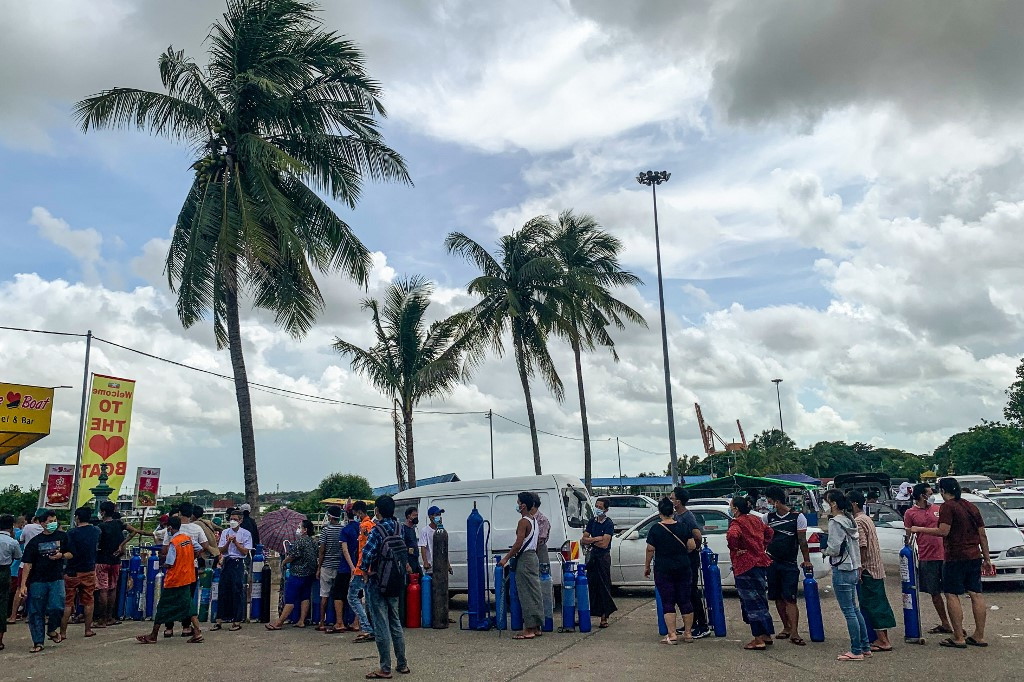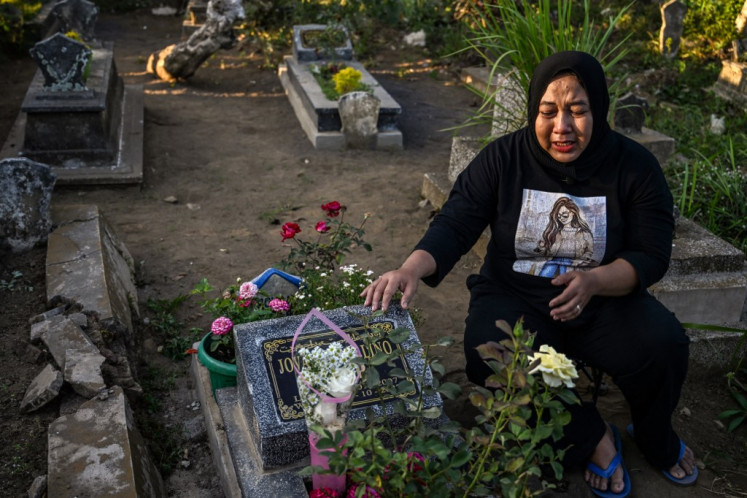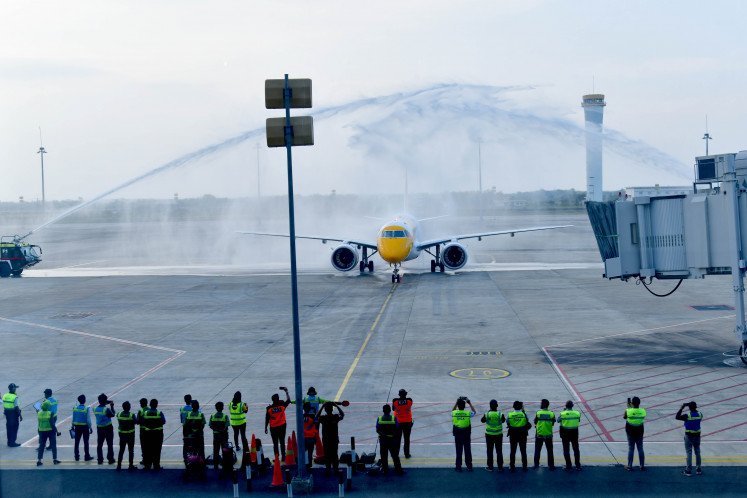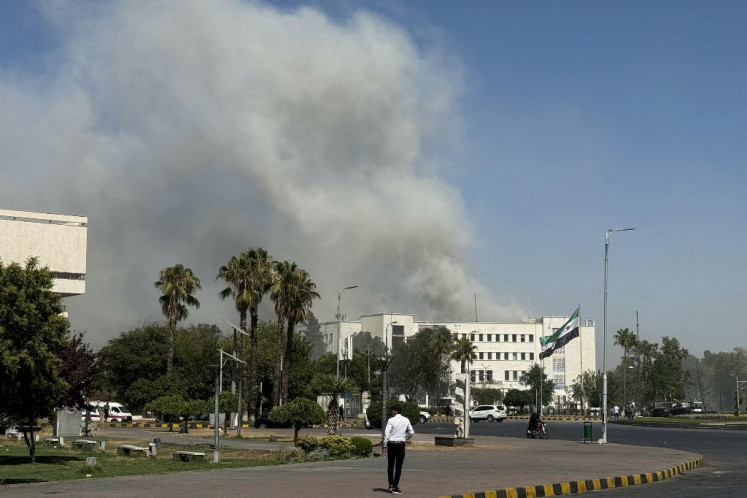Popular Reads
Top Results
Can't find what you're looking for?
View all search resultsPopular Reads
Top Results
Can't find what you're looking for?
View all search resultsInternational efforts 'urgent' to avoid Myanmar becoming global COVID-19 epicenter
Myanmar's NUG foreign minister and regional experts have raised a red flag to the international community that the military coup and resulting conditions on the ground could soon turn the country into the world's pandemic epicenter.
Change text size
Gift Premium Articles
to Anyone
R
egional experts are urging neighboring countries and international organizations to adopt China’s strategy of providing vaccines directly to groups of people that need it to halt the spread of highly transmissible variants, which could turn Myanmar into the global epicenter of the COVID-19 pandemic.
Daw Zin Mar Aung, the foreign minister in the National Unity Government (NUG) of Myanmar, quoted health experts predicting that the coronavirus outbreak in Myanmar had not yet reached its peak and that “the worst is yet to come”.
Executive director Emma Leslie of the Centre for Peace and Conflict Studies, based in Phnom Penh, called for a “pragmatic and coordinated approach”, as some 1,000 people in Myanmar were dying each day and 37 percent of 15,000 daily tests were producing positive results.
“I can only underline the gravity of the situation and the need for urgent practical action [that] I think should impress the ASEAN meeting and dialogue partners this week,” said retired Thai ambassador Kobsak Chutikul, who also once headed Myanmar's international advisory panel on the Rohingya. “It can no longer be business as usual, because the situation percolating in Myanmar is like a tsunami wave coming to overtake the ASEAN region.”
The three spoke on Sunday at a virtual briefing on the COVID-19 situation in Myanmar organized by the Asia News Network, an alliance of 23 national media in 20 Asian countries.
Read also: Indonesia calls on Myanmar to accept ASEAN special envoy
The briefing coincided with the first day of the ASEAN Foreign Ministers’ Meeting on Aug. 1 in Brunei Darussalam, where delegates spent five hours wrangling over the appointment of an ASEAN special envoy to Myanmar to lead humanitarian efforts but failed to reach a consensus.
NUG foreign minister Mar Aung said at the briefing, “We don’t want international organizations to pick sides, but [to] engage with both the State Administration Council [SAC] and the NUG.”
She was referring to the council currently governing in the country led by Gen. Min Aung Hlaing of the military junta.
Meanwhile, Leslie pointed to China’s health strategy for Myanmar, where it was supplying vaccines to the SAC as well as distributing 1 million vaccine doses directly to northernmost Kachin state, which shares a border with China.
“We know Yunnan province is very determined to try and stem the increase of Covid [sic] going across the borders, and all Yunnan governors and government administrators are told fighting Covid is only their priority in the next six months,” said Leslie.
“We have to think of Myanmar as a patchwork quilt, and each patch of it has to have a different approach. There is not going to be one simple unified panacea for this. [...] For example, the border is not controlled by the Tatmadaw,” she continued. Leslie stressed an approach that was “pragmatic from outside looking in […] from many angles and different relationships”.
She also suggested that Thailand take seriously the idea of vaccinating a “buffer zone” along its border with Myanmar border. “(This is) not to treat the crisis in isolation. We know how much Thai people are suffering […], but we need to contain quickly so [Myanmar] doesn’t become a massive regional crisis,” she said.
“But to do that is a complicated relationship which needs to be put in place. We look to Thai leadership for that. [Thailand] has the capacity and ability to mobilize vaccines. (It) has to be handled delicately and sensitively, making sure that Thai people are given opportunity to be vaccinated,” she added.
Leslie envisioned the Thai Red Cross being part of the solution, as the organization had the capacity to mobilize vaccine delivery to border regions, where ethnic minorities like the Karen people had readied the local health infrastructure for a vaccination rollout.
“ASEAN should be the coordinator, also via Myanmar’s border areas with Bangladesh and India, under the same model,” she suggested.
Mar Aung said that while Myanmar’s public health system had responded reasonably well in the first and second waves of COVID-19, it had now collapsed totally under the weight of incoming variants.
The crisis has been compounded by ongoing clashes between the military-led SAC and protesters, including some 700 doctors and nurses who have joined the anti-coup Civil Disobedience Movement.
The NUG, which was set up as an alternative government and is now outlawed by the junta, has established a central committee for Covid-19 prevention, treatment and control. The committee has reached out to international organizations to request aid and assistance for the Myanmar people and is providing knowledge and support to about 5 million people, according to Mar Aung.
Read also: Southeast Asia sees surge in COVID-19 cases
“Because of the coup, Myanmar’s response to the Covid situation is quite difficult and different to other countries,” she continued. “Some of the people who are trying to get medical care have been arrested and doctors arrested as well. They used to operate clinics, but they are there no more. The military goes after them, arrests and confiscates medical equipment.”
Thai diplomat Chutikul highlighted that Myanmar bordered both India and China, or half of the world’s population. “Not to mention Bangladesh, […] the possibility of Myanmar becoming a global epicenter of the pandemic is very real and danger for everyone across all borders,” he said.
“Now all overtaken by events, we are behind the curve now, we have to act immediately, assistance has to go in [to Myanmar], and everybody should see they have a vested interest in this,” Chutikul underlined.
“If not, the [COVID-19] tsunami will come and will sweep over and drown everybody else in the region,” he said.







